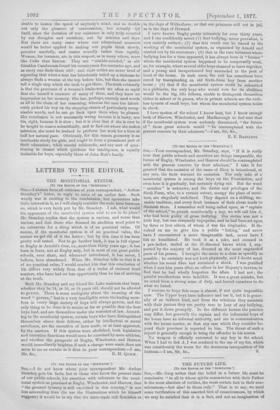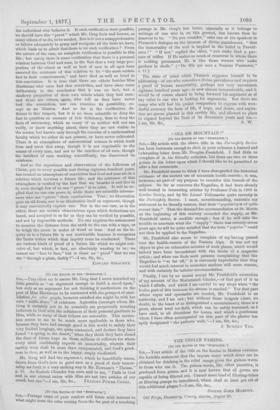THE FUTURE LIFE.
go THE EDITOR OF THE 44 HPROTATOR."3 Sin,—Mr. Greg writes that the belief in a future life must be. conclusive "to all to whose spirits communion with their Father is the most absolute of verities, the most certain fact in their con- sciousness—but alas! to those only." That is to say, we need some verification of this asserted fact of consciousness, by which we may be satisfied that it is a fact, and not an imagination of
the individual who believes it. If such verification were possible, we should have the " proof " which Mr. Greg feels and knows, as many others of us do, to be needed. But is it not a misapprehension or failure adequately to grasp and recognise all the facts we have, which leads us to admit that there is no such verification ? From the nature of the case, no complete verification is possible in this life ; but surely there is some verification that there is a personal relation between God and man, in the fact that a very large pro- portion of the wisest as well as beat of men in all ages have asserted the existence of this relation to be "the most certain fact in their consciousness," and have died as well as lived in this conviction. It is true that there are others besides Miss Martineau who once had this conviction, and have since come deliberately to the conclusion that it was no fact, but a shadowy projection of their own minds which they had seen ; and there are others, again, who tell us they have never had the conviction, nor can conceive its possibility, ex- cent as an illusion. And so far is the verification de- ficient in this respect, but it is no more scientific to deny the fact in question on account of this deficiency, than to deny the facts of astronomy, which so many of us neither will nor can verify, or know anything about, since they are not visible to the senses, but known only through the exercise of a mathematical faculty which we either do not possess, or have never cultivated. There is an atmosphere of astronomical science in which truth lives and error dies away, though it is not cognisable to the senses of every man, and not to the intellect of all men, though the intellect of men working scientifically, has discovered its existence.
And so the experience and observations of the followers of Christ, put to every possible test during eighteen hundred years, has created an atmosphere of conviction that God and man are in a relation which involves a future life ; and the existence of this atmosphere is verified by the fact that we breathe it and live in it, even though few of us can " prove" it to exist. It will be re- plied that no one can prove it, while there are scientific astrono- mers who can " prove " their conclusions. True ; no illustration goes on all-fours, nor is an illustration itself an argument, though it may conveniently explain one. But in the one case, as in the other, there are certain observations upon which deductions are based, and accepted in so far as they can be verified by possible, and not by impossible methods. No one requires the astronomer to measure the distance from the earth to the sun with a tape, or to weigh the moon in scales of wood or iron. And so the in- quiry as to a future life is not unscientific because it recognises the limits within which that inquiry must be conducted. There are various kinds of proof of a future life which we might con- ceive of, but which, in fact, are absolutely wanting to us ; we cannot see "face to face," but is there no " proof " that we can see "through a glass, darkly ?"—I am, Sir, &c., EDWARD STRACHEY.































 Previous page
Previous page